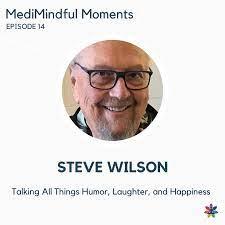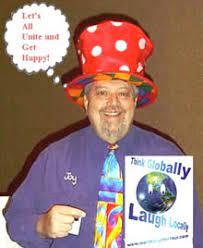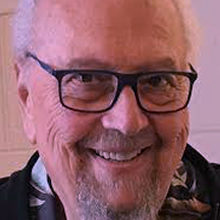Según investigué, The World Laughter (WLT) tuvo un comienzo muy exitoso el 27 de mayo de 1999 en Columbus, Ohio. Con una gira por 14 ciudades de Estados Unidos. Por lo tanto, esta institución cumple 25 años en este 2023. Desde sus inicios, WLT ha sido reconocida como una influencia global significativa en las aplicaciones prácticas de la risa y el humor para la salud y la paz mundial.
Pero, ¿quién la fundó?
Pues el señor Steve Wilson. Él es psicólogo, risoterapeuta (risólogo como se nombre él). Es un profesional de la oratoria certificado muy popular y talentoso, educador experimentado de profesionales de la salud mental, miembro de organizaciones claves como la Asociación para el Humor Terapéutico y Aplicado (AATH), la Sociedad Internacional de Estudios del Humor (ISHS) y La Asociación de Estudios Estadounidenses del Humor (AHSA). También es el Director de la Fundación de las Artes y Ciencias de la Risa y Director del Mes Nacional del Humor en Estados Unidos.
Además, recibió en 2010 el Doug Fletcher Lifetime Achievement Award y el premio Rire d'Or Golden Laughter en 2007, otorgado por la Escuela Francesa de la Risa y el Bienestar.
¿Por qué la fundó?
La creación de World Laughter Tour fue una idea que se le ocurrió durante una gira de conferencias por la India en 1998, después de participar en el Juhu Beach Laughter Club en la costa árabe de Mumbai. En la India, los clubes de la risa se denominaban “Hasya Yoga”. Como se imaginó, ciertas risas y prácticas actitudinales podrían sistematizarse y enseñarse como un medio para influir en la salud y la paz, al mismo tiempo que promovía la felicidad y la longevidad.
Pues hoy tengo invitado en este vis a vis.de hoy a este gran emprendedor, estudioso y gurú de la Risa estadounidense. Es un honor y un placer.
PP: Estimado Steve, ¿por qué no te presentas para que los lectores de nuestra página humorsapiens.com te conozcan? Pero desde el punto de vista humano, porque ya te presenté profesionalmente.
STEVE: Ahora tengo 82,5 años. Nací en Filadelfia, Pensilvania, EE. UU. Casado con Pamela 14,473 días a partir del 1/8/23. Tengo 5 niños y 11 nietos.
Estoy asombrado y divertido de cómo ha resultado la vida para mí.
Obtenga más información sobre mí en https://www.worldlaughtertour.com/about/meet-steve/.
PP: Ja, ja, iba a promocionar la página web de tu Institución, pero te me adelantaste. Da igual, hiciste bien (por si se me olvidaba). Pero ahora “en serio”: ¿cuándo, cómo y por qué surge World Laughter Tour?
STEVE: En 1998, me invitaron a dar una conferencia en la India sobre poner el humor a trabajar en el trabajo. Durante una gira de conferencias de 17 días, conocí al Dr. Kataria, me enteré de su idea de “clubes de la risa”, vi que era muy similar a varias prácticas conocidas como Terapias de Actividad. La risa como actividad terapéutica era desconocida en EE. UU., donde el énfasis estaba en el humor terapéutico al estilo de Norman Cousins.
Pam y yo decidimos llevar a Kataria a EE. UU. para ver cómo responderían la gente y los medios aquí. Programamos una gira de conferencias/demostraciones por 14 ciudades en EE. UU. En 1999 trajimos a los Katarias aquí durante siete semanas para demostrar lo que él llamaba yoga de la risa e intercambiar ideas para aprender unos de otros.
PP: Casualmente, en mi caso, Madam Kataria y Norman Cousins también fueron inspiradores para que me dedicara a estudiar el humor y la risa. Ahora dime, querido Steve, ¿por qué es tan significativo para ti celebrar estos 25 años?
STEVE: WLT se fundó casi al mismo tiempo que se establecía Internet, lo que nos ha brindado nuevas formas de comunicarnos con el mundo. Estamos agradecidos de haber contribuido a aumentar la conciencia de personas de todo el mundo sobre la importancia del humor y la risa para la condición humana. Antes de eso, estos temas se habían considerado triviales, sin sentido, juveniles, juguetes. Hemos ayudado a entrenar a miles en estos métodos terapéuticos, promovido estudios científicos, escrito libros y artículos, viajado por el mundo y publicitado las buenas nuevas. El cambio positivo en la conciencia mundial acerca de cómo estos aspectos de la humanidad contribuyen a la salud, la felicidad y la paz es digno de una gran celebración.
PP: ¡Claro que sí! En Humor Sapiens también celebramos contigo. Pero, ¿cómo ves el futuro de World Laughter Tour?
STEVE: Estoy abierto a cómo funcionan las cosas. El esfuerzo está en mi corazón y alma para siempre. Queda por ver qué tipo de organización(es) futura(s) impulsarán el movimiento.
PP: No te quepa duda, algo tan valioso para el ser humano es imposible que desaparezca. Tu relevo está garantizado. Tu legado tiene que cuidarse y promoverse. Bueno, ahora me pongo algo más teórico: ¿qué significa para ti “Humor”?
STEVE: Por definición, es un fenómeno psicológico de la perspectiva de uno. Se trata de la voluntad de aligerar y no apretar. La cualidad que llamamos "graciosa" está en el ojo del espectador, no en el contenido del material, por ejemplo, chistes. Las personas pueden tener varios sentidos del humor para manifestarse en diferentes momentos, bajo diferentes circunstancias. Un gran sentido del humor requiere una gran sensibilidad sobre el humor.
PP: Estoy de acuerdo contigo, aunque yo lo definiría distinto. Y en cuanto a tu profesión, ¿es lo mismo la risoterapia que la terapia del humor?
STEVE: No. La risa y el humor están relacionados pero no son lo mismo. La risa es una acción/respuesta física. El humor es psicológico, una forma de percibir las cosas. Podemos cultivar prácticas y estilos de vida que aprovechen nuestras oportunidades para reír o para el humor, o ambas. Cada conjunto de prácticas se puede convertir en estrategias. Son similares en algunos aspectos, pero creo que para obtener el máximo beneficio, deben entenderse como distintos pero posibles de combinar.
PP: En eso también estamos de acuerdo. Incluso he tenido experiencias donde en un curso o taller práctico de “humorterapia”, he utilizado ejercicios de risoterapia. En mi opinión, sí son dos cosas distintas, pero teóricamente. En la práctica las uno. ¿Qué aconsejarías a los colegas que se encuentran con agelastos o catagelofóbicos (personas que no se ríen o tienen fobia a la risa y la alegría) en su trabajo como risoterapeutas? Me refiero a una estrategia, una técnica, un consejo o una recomendación.
STEVE: Eso es demasiado complejo para detallarlo aquí. Las fobias son casos especiales de miedos irracionales, y no es lo mismo que "No me he estado riendo tanto como me gustaría".
PP: No te lo pregunté para que profundizaras, sé que es un tema complejo. Pero he hablado con otros profesionales y tienen estrategias y técnicas que sí me dicen, como por ejemplo los catagelofóbicos deben tener una atención psicológica profesional y es difícil todo con ellos, como señalas. Pero lo de los agelastos es distinto, no son problemas clínicos, no son fobias, son conductas culturales que han incorporados en su formación, por ejemplo, desde que nacen les dicen que reír es feo, que no es serio, que jugar es superficial, etc. A esos, me dicen, se les convence de a poco, mostrándoles lo placentera que es la risa e integrándolos al grupo de trabajo. Para eso tienen técnicas, recomendaciones. Pero ahora cambio de nuevo a ti en lo personal: dentro del humor y la risa, ¿qué te gustaría hacer personalmente que no hayas hecho?
STEVE: Quisiera seguir avanzando en un excelente trabajo y pensando en quienes me antecedieron en este movimiento.
PP: ¿Alguna anécdota graciosa o ingeniosa de tu trabajo como risoterapeuta?
STEVE: Buenos resultados cuando los individuos aprenden a superar lo que les impide reír o estar más "de humor".
PP: Me debes una anécdota entonces, porque tu respuesta fue buena, pero es más una experiencia, que valoro, claro. Así que para ir cerrando este vis a vis, dime, ¿cuál pregunta te hubiera gustado que te hiciera y no te hice? ¿Puedes responderla ahora?
STEVE: Es un favor especial para ti que yo haya intentado responder a cualquiera de estas preguntas. Prefiero mucho más un diálogo conversacional en vivo.
Te deseo lo mejor, Pepe.
PP: Sí, me di cuenta por tus respuestas tan breves. Quizás un día podamos tener esa conversación en vivo. Por ahora esta era la posibilidad que tenía. Lo siento. De todas formas, te agradezco infinitamente que hayas hecho ese gran esfuerzo en responderme por escrito y te agradezco muchísimo ese enorme favor que decidiste hacerme.
Yo también te deseo mucha salud, muchos éxitos y de nuevo felicidades por los 25 años de The World Laughter Tour.
(Este texto ha sido traducido al español por Google Translate)


Interview with Steve Wilson
By Pepe Pelayo
Laughter and humor are related but not the same.
As I researched, The World Laughter (WLT) got off to a very successful start on May 27, 1999 in Columbus, Ohio. With a tour of 14 cities in the United States. Therefore, this institution turns 25 in 2023.
Since its inception, WLT has been recognized as a significant global influence on the practical applications of laughter and humor for health and world peace.
But who founded it?
Well, Mr. Steve Wilson. He is a psychologist, laughter therapist (risologist as his name is). He is a highly popular and talented Certified Public Speech Practitioner, experienced educator of mental health professionals, member of key organizations such as the Association for Applied and Therapeutic Humor (AATH), the International Society for Humor Studies (ISHS) and The American Humor Studies Association (AHSA). He is also the Director of the Laughter Sciences and Arts Foundation and Director of National Humor Month in the United States.
In addition, he received the Doug Fletcher Lifetime Achievement Award in 2010 and the Rire d'Or Golden Laughter award in 2007, awarded by the French School of Laughter and Well-being.
Why did you found it?
The creation of the World Laughter Tour was an idea that came to him during a speaking tour of India in 1998, after participating in the Juhu Beach Laughter Club on Mumbai's Arabian coast. In India, laughter clubs were called "Hasya Yoga". As imagined, certain laughter and attitudinal practices could be systematized and taught as a means of influencing health and peace, while promoting happiness and longevity.
Well, today I have a guest to "talk" to this great entrepreneur, scholar and guru of American laughter. It is an honor and a pleasure.
PP: Dear Steve, why don't you introduce yourself so that the readers of our humorsapiens.com page get to know you? But from the human point of view, because I already introduced you professionally.
STEVE WILSON: Now 82.5 years old. Born Philadelphia, Pennsylvania, USA.
Married to Pamela 14,473 day as of 8/1/23.
5 children.
11 grandchildren.
I am amazed and amused at how life has turned out for me.
Learn more about me at https://www.worldlaughtertour.com/about/meet-steve
PP: Ha ha, I was going to promote your institution's website, but you beat me to it. It doesn't matter, you did a good job in case I forgot. But now “seriously”: when, how and why did World Laughter Tour come about?
STEVE WILSON: 1998, I was invited to lecture in India about putting humor to work at work. During a 17-day lecture tour, I met Dr. Kataria, learned about his idea for 'laughter clubs', saw that it was very similar to various practices known as Activity Therapies. Laughter as a therapeutic activity was unknown in USA where the emphasis was on therapeutic humor a la Norman Cousins.
Pam and I decided to bring Kataria to USA to see how people and media here would respond to it. We scheduled at 14-city lecture/demonstration tour in USA. In 1999 we brought the Katarias here for seven weeks to demonstrate what he was calling laughter yoga, and to exchange ideas to learn from each other.
PP: Coincidentally, in my case, Madam Kataria and Norman Cousins also inspired me to study humor and laughter. Now tell me, dear Steve, why is it so significant for you to celebrate these 25 years?
STEVE WILSON: WLT was founded around the same time that the Internet was getting stated, giving us new ways to communicate with the world. We are grateful to have contributed to raising consciousness of people around the world about the significance of humor & laughter to the human condition. Prior to that, these topics had been considered trivial, nonsense, juvenile, playthings. We have helped trained thousands in these therapeutic methods, fostered scientific studies, wrote books and articles, traveled the world, and publicized the good news. The positive change in world consciousness about how these aspects of humanity contribute to health, happiness, and peace is worthy of great celebration.
PP: Of course! At Humor Sapiens we also celebrate with you. But how do you see the future of World Laughter Tour?
STEVE WILSON: I'm open to how things work out. The effort is in my heart and soul forever. It remains to be seen just what kind of future organization(s) will advance the movement.
PP: Do not doubt it, something so valuable to the human being is impossible to disappear. Your relief is guaranteed. Your legacy has to be cared for and promoted. Well, now let me get something more theoretical: what does “Humor” mean to you?
STEVE WILSON: By definition, it is a psychological phenomenon of one's perspective. It involves the willingness to lighten up and not tighten up. The quality we call "funny" is in the eye of the beholder, not in the content of the material, e.g., jokes. People can have several senses of humor to manifest at different times, under different circumstances. A great sense of humor requires a great sensitivity about humor.
Even if there was no evidence that laughter and humor had positive implications for health and happiness, I would want a life filled with humor and laughter. Without that that, our existence would be dreadful.
PP: I agree with you, although I would define it differently. And as for your profession, is laughter therapy the same as humor therapy?
STEVE WILSON: No. Laughter and humor are related but not the same. Laughter is a physical action/response. Humor is psychological, a way of perceiving things. We can cultivate practices and lifestyles that capitalize on our opportunities to laugh or opportunities for humor, or both. Each set of practices can be made into strategies. They are similar in some respects, but I believe that to get the maximum benefit, they need to be understood as distinct yet possible to blend.
PP: We also agree on that. I have even had experiences where in a course or practical workshop on "humor therapy", I have used laughter therapy exercises. In my opinion, they are two different things, but theoretically. In practice one. What would you advise colleagues who encounter agelastos or catagelophobes (people who do not laugh or have a phobia of laughter and joy) in their work as laughter therapists? I mean a strategy, a technique, a piece of advice or a recommendation.
STEVE WILSON: This is too complex to detail here. Phobias are special cases of irrational fears, and not the same thing as "I haven’t been laughing as much as I would like to."
PP: I didn't ask you to go deeper, we know it's a complex topic. But I have spoken with other professionals and they have strategies and techniques that do speak to me, for example, catagelophobes must have professional psychological care and everything is difficult with them, as you point out. But the agelastos are not clinical problems, they are nothing more than phobias, they are cultural behaviors that have been incorporated by their training, for example, since they are born they are told that laughing is ugly, that it is not serious, that playing is superficial, etc. Those, they tell me, are convinced little by little, showing them how pleasant laughter is and integrating them into the work group. For that they have techniques, recommendations, etc. But now I switch back to you personally: within the humor and laughter, what would you personally like to do that you haven't already done?
STEVE WILSON: I would like to keep advancing to excellent work and thinking of those who preceded me in this movement.
PP: Any funny or witty anecdote from your work as a laugh therapist?
STEVE WILSON: Good results when individuals learn to overcome what blocks them from laughing or from being more "in humor".
PP: You owe me an anecdote then, because your answer was good, but it's more of an experience, which I also value, of course. So to close this "dialoco", ten cents, what question would you have liked me to ask you and I didn't? Can you answer now?
STEVE WILSON: It is a special favor for you that I have attempted to answer any of these questions. I much prefer a live conversational dialog.
I wish you well.
PP: Yes, I realized from your very brief answers. Maybe one day we can have that conversation live. For now this was the chance he had. I'm sorry. In any case, I am infinitely grateful that you have made that great effort to answer me in writing and I am very grateful for that enormous favor that you decided to do me.
I also wish you good health, much success and once again congratulations on the 25th anniversary of The World Laughter Tour.

